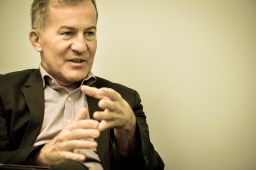Editor’s Note: Michael Bociurkiw is a writer and development professional who has worked on emergencies on several continents, most recently as a spokesman for the Organization for Security and Co-operation in Europe. The opinions expressed in this commentary are his.
Without firing a shot or sacrificing a life, the Ukrainian security services have scored a direct propaganda hit against the Kremlin in its staging of the “murder” of Russian journalist Arkady Babchenko. But at what cost?
The unfolding story over the past 24 hours is as shocking as it is bizarre.The journalism community and friends of Babchenko mourned as news of his alleged murder – by an assailant painted as cowardly for shooting him in the back three times – was reported Tuesday.

Less than 24 hours later, the 41-year-old Babchenko was paraded at a press conference organized by Ukraine security services. The journalist, who was a prime target for his scathing criticism of the Kremlin, said the Ukrainian authorities approached him a month ago with evidence that his murder was planned for $30,000. “I understood it had to be an operation of Russian special services. I had no choice but to participate in the sting,” he told a packed Kiev news conference today.
Two suspects are in custody and Ukrainian authorities say they’ve established a link to Russian special forces. To some, the operation was reminiscent of Egypt’s attempt in 1984 to fake the murder of a leading opponent of Libyan strongman Moammar Gadhafi.
In a statement, the Russian foreign ministry said it was glad Babchenko is alive, but called the incident “another anti-Russian provocation” and said it was “obviously designed for a certain propaganda effect.”
That Babchenko would allow himself to take part in a sting operation, even dupe his close friends and colleagues, to catch his alleged assailant compromises journalists at a time when they are under attack in Ukraine and in many other places around the world.
Do we need another excuse for the media to be branded as fake or manipulative? Kiev authorities said they were made aware of the plot four months ago and staged the elaborate ploy in order to capture suspects. Ukrainian television channel 112 is reporting that a suspect also planned to set up a “weapons base” in the Ukrainian capital in order to launch more terrorist attacks.
Wrote my friend, journalist Anna Nemtsova: “No fake news ever shocked reporters working in Russia and Ukraine more than this story.”
While expressing relief that Babchenko is alive, many journalists and media watchdogs have come out slamming the operation.
The global media watchdog, Reporters Without Borders, said, “it is always dangerous for States to play with the facts, and also on the back of journalists.” And the Committee to Protect Journalists says that it is investigating what it calls “an unprecedented situation” – adding that the Ukrainian authorities need to disclose what necessitated the extreme measure of staging news of the murder.
One journalist described the sting as “a mindless and tragic mistreatment of public empathy that discredits so many things at once – Ukraine, Russian liberals, journalists. Only the Kremlin wins.”
Whatever the explanation, the operation could have been done in such a way as to not compromise the journalist – or the news media as a whole.
Ukrainian law enforcement has a well-deserved reputation for incompetence, cover-ups and colluding with corrupt oligarchs. Several murder cases – including that of Pavel Sheremet, a journalist who was killed in broad daylight in Kiev in 2016 – remain unsolved and not one wanted major figure from the previous administration of Viktor Yanukovych has been placed behind bars. And so the temptation to show a major win in its hybrid war against Russia must have been irresistible. But this sting operation resembled something more like an amateur public relations exercise than a serious counter-intelligence operation.
Moreover, parading Babchenko at a press conference in Kiev plays into the hands of those who accuse the media of being fake or untrustworthy. As we traverse the shoals of a post-truth world it can only further undermine people’s trust in journalism. Furthermore, the credibility of Ukrainian security officials will suffer in the long term. Anything the Ukrainian Government says henceforth will now have to be double and triple checked.
Ukraine’s beleaguered president, Petro Poroshenko, also needs to answer for what could very well end up being a major strategic communications disaster for his country. With elections next year and his approval ratings in the single digits, he has back-pedaled on internationally-backed reforms designed to break up the state security service, the SBU, into a leaner organization that is more professional and efficient – and less prone to corruption.
At a time when Ukraine is positioning itself as a responsible member of the European community and is begging international donors for assistance in countering “fake news,” why would it contribute to its spread?
As for Babchenko? It could be that the price for his head has significantly increased, and he will likely require round-the-clock protection for the rest of his life. Then again, it is not often that one gets to read what has been written about you after your death.

